Google: "As We Say, NOT As We Do"
Due to heavy lobbying, the FTC's investigation into Google's business practices has ended with few marks or bruises on Google's behalf. If the EU has similar results, you can count on Google growing more anti-competitive in their practices:
Google is flat-out lying. They’ve modified their code to break Google Maps on Windows Phones. It worked before, but with the ‘redirect,’ it no longer works.
We are only a couple days into the new year, but there have already been numerous absurdities highlighted, in addition to the FTC decision & Google blocking Windows Phones.
When is Cloaking, Cloaking?
Don't ask Larry Page:
Mr. Page, the CEO, about a year ago pushed the idea of requiring Google users to sign on to their Google+ accounts simply to view reviews of businesses, the people say. Google executives persuaded him not to pursue that strategy, fearing it would irritate Google search users, the people say.
...
Links to Google+ also appear in Google search-engine results involving people and brands that have set up a Google+ account.
Other websites can't hardcode their own listings into the search results. But anyone who widely attempted showing things to Googlebot while cloaking them to users would stand a good chance of being penalized for their spam. They would risk both a manual intervention & being hit by Panda based on poor engagement metrics.
Recall that a big portion of the complaint about Google's business practices was their scrape-n-displace modus operandi. As part of the FTC agreement, companies are able to opt out of being scraped into some of Google's vertical offerings, but that still doesn't prevent their content from making its way into the knowledge graph.
Now that Google is no longer free to scrape-n-displace competitors, apparently the parallel Google version of that type of content that should be "free and open to all to improve user experience" (when owned by a 3rd party) is a premium feature locked behind a registration wall (when owned by Google). There is a teaser for the cloaked information in the SERPs, & you are officially invited to sign into Google & join Google+ if you would like to view more.
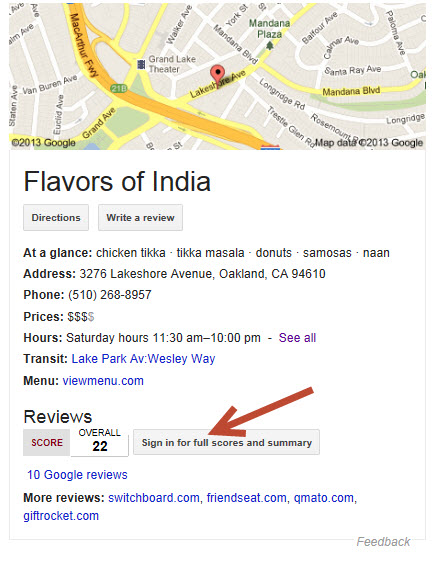
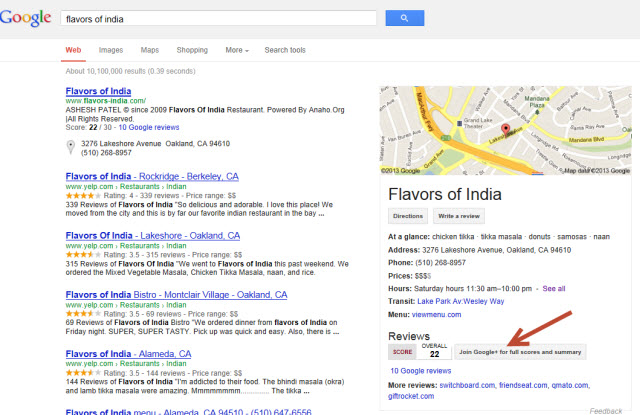
Information wants to be free.
Unless it is Google's.
Then users want to be tracked and monetized.
Trademark Violations & Copyright Spam
A few years back Google gave themselves a pat on the back for ending relationships with "approximately 50,000 AdWords accounts for attempting to advertise counterfeit goods."
How the problem grew to that scale before being addressed went unasked.
Last year Google announced a relevancy signal based on DMCA complaints (while exempting YouTube) & even nuked an AdSense publisher for linking to a torrent of his own ebook. Google sees a stray link, makes a presumption. If they are wrong and you have access to media channels then the issue might get fixed. But if you lack the ability to get coverage, you're toast.
Years ago a study highlighted how Google's AdSense & DoubleClick were the monetization engine for stolen content. Recently some USC researchers came to the same conclusion by looking at Google's list of domains that saw the most DMCA requests against them. Upon hearing of the recent study, Google's shady public relations team stated:
"To the extent [the study] suggests that Google ads are a major source of funds for major pirate sites, we believe it is mistaken," a Google spokesperson said. "Over the past several years, we've taken a leadership role in this fight. The complexity of online advertising has led some to conclude, incorrectly, that the mere presence of any Google code on a site means financial support from Google."
So Google intentionally avails their infrastructure to people they believe are engaged in criminal conduct (based on their own 50,000,000+ "valid" DMCA findings) and yet Google claims to have zero responsibility for those actions because Google may, in some cases, not get a direct taste in the revenues (only benefiting indirectly through increasing the operating costs of running a publishing business that is not partnered with Google).
A smaller company engaged in a similar operation might end up getting charged for the conduct of their partners. However, when Google's ad code is in the page you are wrong to assume any relationship.
The above linked LA Times article also had the following quote in it:
"When our ads were running unbeknownst to us on these pirate sites, we had a serious problem with that," said Gareth Hornberger, senior manager of global digital marketing for Levi's. "We reached out to our global ad agency of record, OMD, and immediately had them remove them.... We made a point, moving forward, that we really need to take steps to avoid having these problems again."
Through Google's reality warping efforts the ad network, the ad agency, the publisher, and the advertiser are all entirely unaccountable for their own efforts & revenue streams. And it is not like Google or the large ad agencies lack the resources to deal with these issues, as there is some serious cash in these types of deals: "WPP, Google's largest customer, increased its spending on Google by 25% in 2012, to about $2 billion."
These multi-billion Dollar budgets are insufficient funds to police the associated activities. Whenever anything is mentioned in the media, mention system complexity & other forms of plausible deniability. When that falls short, outsource the blame onto a contractor, service provider, or rogue partner. Contrasting that behavior, the common peasant webmaster must proactively monitor the rest of the web to ensure he stays in the graces of his Lord Google.
DMCA Spam
You have to police your user generated content, or you risk your site being scored as spam. With that in mind, many big companies are now filing false DMCA takedown requests. Sites that receive DMCA complaints need to address them or risk being penalized. Businesses that send out bogus DMCA requests have no repercussions (until they are eventually hit with a class action lawsuit).
Remember how a while back Google mentioned their sophisticated duplication detection technology in YouTube?
There are over a million full movies on YouTube, according to YouTube!
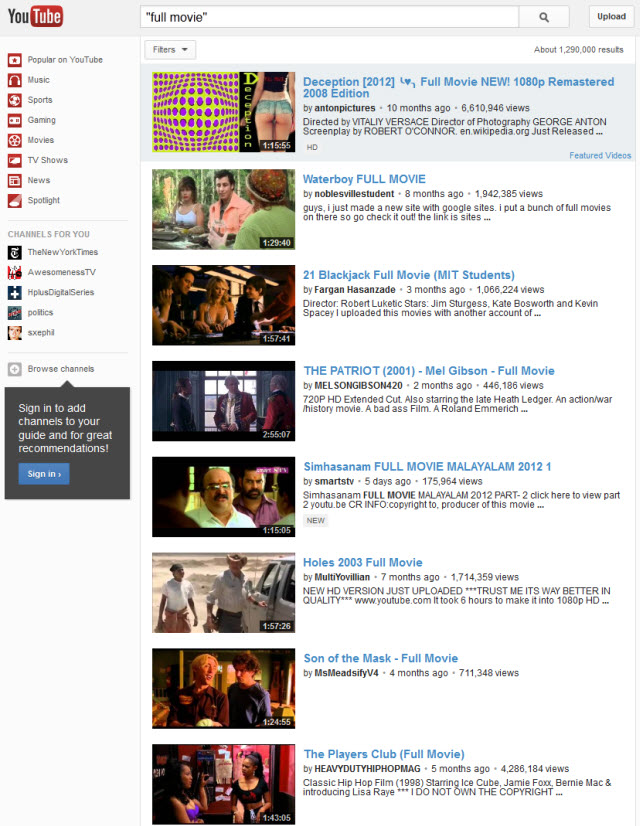
The other thing that is outrageous is that if someone takes a video that is already on YouTube & re-uploads it again, Google will sometimes outrank the original video with the spam shag-n-republish.
In the below search result you can see that our video (the one with the Excel spreadsheet open) is listed in the SERPs 3 times.
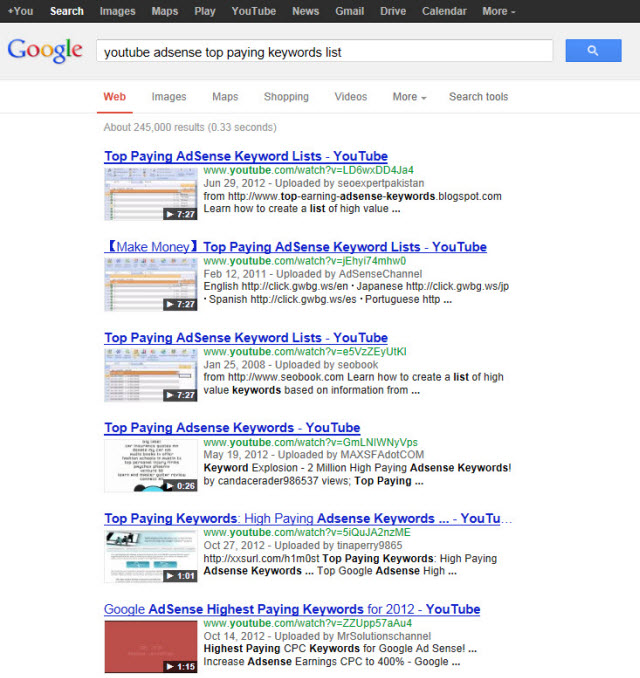
The version we uploaded has over a quarter million views, but ranks below the spam syndication version with under 100 views.
There are only 3 ways to describe how the above can happen:
- a negative ranking factor against our account
- horrible relevancy algorithms
- idiocy
I realize I could DMCA them, but why should I have to bear that additional cost when Google allegedly automatically solved this problem years ago?
Link Spam
Unlike sacrosanct ad code, if someone points spam links at your site, you are responsible for cleaning it up. The absurdity of this contrast is only further highlighted by the post Google did about cleaning up spam links, where one of the examples they highlighted publicly as link spam was not a person's spam efforts, but rather a competitor's sabotage efforts that worked so well that they were even publicly cited as being outrageous link spam.
It has been less than 3 months since Google launched their disavow tool, but since it's launch some webmasters are already engaging in pre-negative SEO. That post had an interesting comment on it:
Well Mr Cutts, you have created a monster in Google now im afraid. Your video here http://www.youtube.com/watch?v=HWJUU-g5U_I says that with the new disavow tool makes negative SEO a mere nuisance.
Yet in your previous video about the diavow tool you say it can take months for links to be disavowed as google waits to crawl them???
In the meantime, the time lag makes it a little more than a "nuisance" don't you think?
Where Does This Leave Us?
As Google keeps adding more advanced filters to their search engines & folding more usage data into their relevancy algorithms, they are essentially gutting small online businesses. As Google guts them, it was important to offer a counter message of inclusion. A WSJ articles mentioned that Google's "get your business online" initiative was more effective at manipulating governmental officials than their other lobbying efforts. And that opinion was sourced from Google's lobbyists:
Some Washington lobbyists, including those who have done work for Google, said that the Get Your Business Online effort has perhaps had more impact on federal lawmakers than any lobbying done on Capitol Hill.
Each of the additional junk time wasting tasks (eg: monitoring backlinks and proactively filtering them, managing inventory & cashflow while waiting for penalties tied to competitive sabotage to clear, filing DMCAs against Google properties when Google claims to have fixed the issue years ago, merging Google Places listings into Google+, etc.) Google foists onto webmasters who run small operations guarantees that a greater share of them will eventually get tripped up.
Not only will the algorithms be out of their reach, but so will consulting.
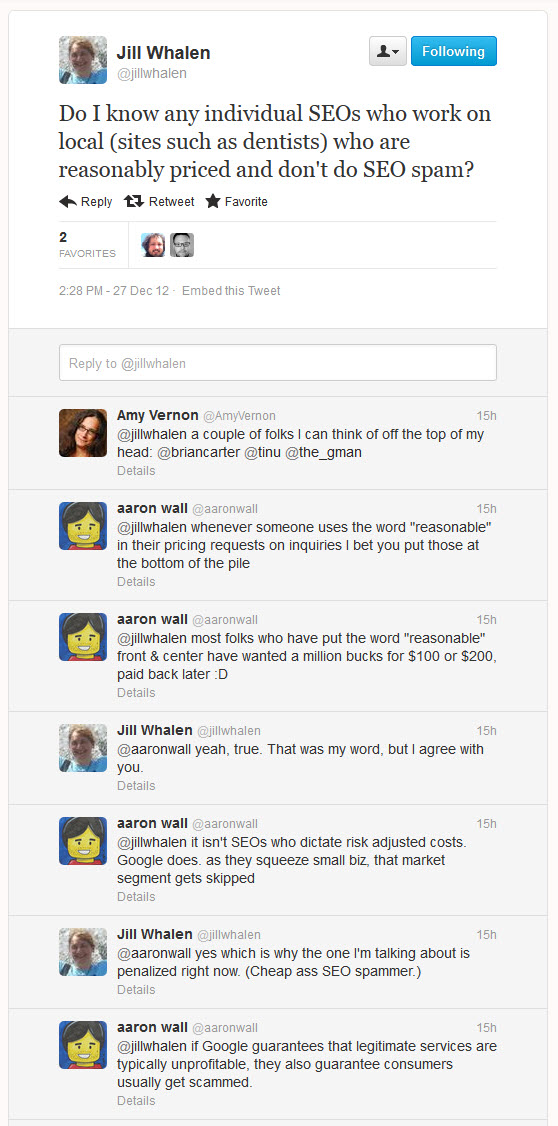
That algorithmic approach will also only feed into further "market for lemons" aspects as consultants skip the low margin, small budget, heavy lifting jobs and focus exclusively on servicing the companies which Google is biasing their "relevancy" algorithms to promote in order to taste a larger share of their ad budgets.
While chatting with a friend earlier today he had this to say:
Business is arbitrage. Any exchange not based in fraud is legitimate regardless of volume or medium. The mediums choose to delegitimize smaller players as a way to consolidate power.
Sadly most journalists are willfully ignorant of the above biases & literally nobody is comparing the above sorts of behaviors against each other. Most people inside the SEO industry also avoid the topic, because it is easier (& more profitable) to work with the elephants & attribute their success to your own efforts than it is highlight the holes in the official propaganda.
I mean, just look at all the great work David Naylor did for a smaller client here & Google still gave him the ole "screw you" in spite of doing just about everything possible within his control.
The linkbuilding tactics used by the SEO company on datalabel.co.uk were low quality, but the links were completely removed before a Reconsideration Request was filed. The MD’s commenting and directory submissions were done in good faith as ways to spread the word about his business. Despite a lengthy explanation to Google, a well-documented clean-up process, and eventually disavowing every link to the site, the domain has never recovered and still violates Google’s guidelines.
If you’ve removed or disavowed every link, and even rebuilt the site itself, where do you go from there?




Comments
We have moved to an online debtor's prison where Google controls not only the point of entry (search) but also the monetization and advertising venues for the majority of online business.
Some are banned from Adwords and Adsense and their organic listings have been penalized into oblivion leaving them literally no power at all in google's new ecosystem.
The free web is dying at the hands of the "don't be evil" crew who are so very very evil themselves. Despots always victimize you while they tell you it's for your own good. Sounds like an abusive relationship.
College kids who lost their Adsense or Adwords accounts for something that happened 10 years ago are now disenfranchised adult small business owners with no options. It's a life sentence.
And the FTC says that's OK.
... in the community one of our members had their AdWords blocked because they had an accurate testimonial on one of the pages on their site. In Google's reply it also suggested that the publisher was not only responsible for the content they publish, but also responsible for what other people put in the comment sections of their site (eg: policing comments not only for links or keyword stuffing or porn/adult stuff & such, but also that if anyone who reads their content has a positive experience with what they recommend their AdWords can get whacked if they don't have some sort of proof those comments are real & accurate).
At the same time, search Google for "HYIP" and there are AdWords ads front & center at the top of the search results promising a 14% rate of return, while telling you that you can get that while "avoiding the risk of the markets."
Worse yet, Google still has an AdSense ad category for "get rich quick schemes" that is enabled by default. So some poor publishers will eventually come under review and get their accounts banned because their sites promote scams that are in the AdSense ad unit!
And the other crazy thing is that Google still tells you that it is a best practice to direct link to the end commerce location, but if the site you link to is editorially controlled by someone else you can't ever recover from issues with a 3rd party business you don't control. Adding the absurdity, in some cases the violations are for ex post facto rules that came into being even years after the advertiser promoted something.
Yes, I was banned from Adwords for an ad I ran about 9 years ago that generated one click. ONE CLICK.
The domain isn't even owned by the same person anymore as far as I can see. It's a completely different product/salespage but just that domain history in my account got me banned...for one click. I had a six-figure spend with Google too for my own company. Nothing related to affiliate stuff or anything questionable like "get rich" stuff.
So the offense was nearly 10 years ago, applied retroactively via ex post facto rules and I'm banned for life. For LIFE.
The more advertising channels Google controls the more disenfranchised banned advertisers are.
I have to say I see extensive reasoning for having people sign into their Google plus account. It allows Google to offer up specialized advertising that is specifically targeted to the user.
Video will also play a huge role in SERPs in the coming year and take up more real estate.
...hedging the ability of publishers to bolt on automated junk content & hedging the ability of Google to allow authors to carry some of their profile with them, if Google ever feels they want to push to displace some of the publishers they can do direct deals with select authors.
Hi,
maybe it will changed something:
http://www.reuters.com/article/2013/01/10/us-eu-google-idUSBRE90917Y2013...
Greetings,
all we can do is hope for the best!
Thanks for the comment. I changed your link from the Yahoo! News location to the Reuters location, since in many cases the Yahoo! News links end up dying off a few months later & such.
Hey Aaron, I know this may be a little off-topic (my apologies) but I have to ask: would you be willing to do an in-depth interview about SEO, SEO Book, and yourself with me for on my blog about SEO? It would be my honor and I think I've got some challenging, funny, and critical questions for you that'll make for a very interesting interview! Plus, to make it worth your while, you can plug SEO Book or whatever you feels needs plugging during or at the end of the interview. It'll be a text interview so you can take a while to answer all the questions instead of having to make time for a phone interview and answer stuff on the spot.
I'm a SEO professional myself btw, heck, I run a SEO agency and have been around the block. That's why I think it'll be an interesting interview: one veteran picking another veteran's brain. Please say yes. It'll be lots of fun man! If you're interested, then you can probably find my email address on my SEO Book profile (or you can Google my name and find me on Google Plus or whatever).
Regards,
Dennis
...email us referencing this page, & with your questions. you can email us at seobook @ gmail
I'll send you all of my questions soon and I'll be sure to reference this page when doing so Aaron :)
... questions send to the email address you provided. I'm looking forward to hearing your thoughts! Hope my questions will be challenging/interesting enough for ya haha
learning a whole new 'internet'
The Internet and search has completely evolved. Also there has been a evolution into the new spamming techniques.
Add new comment